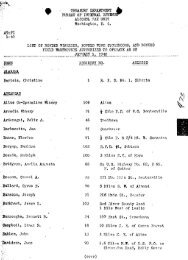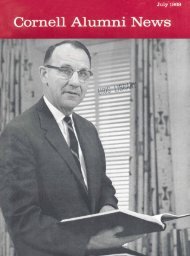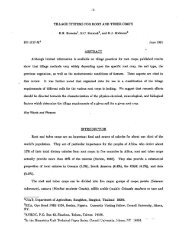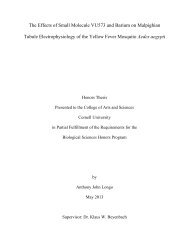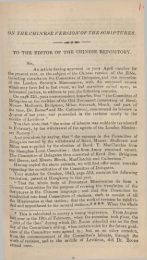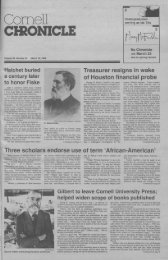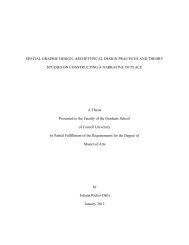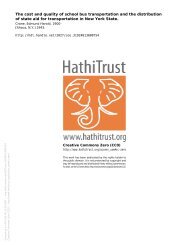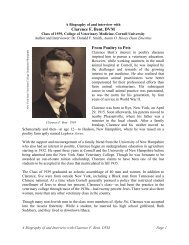archaeological and textual records - eCommons@Cornell - Cornell ...
archaeological and textual records - eCommons@Cornell - Cornell ...
archaeological and textual records - eCommons@Cornell - Cornell ...
Create successful ePaper yourself
Turn your PDF publications into a flip-book with our unique Google optimized e-Paper software.
The earliest writings on Iroquoian magic actually come from Fr. Paul Le<br />
Jeune’s ministry to the Huron. Even though the Seneca are distinct from the Huron,<br />
the spiritual beliefs described are common to both the Huron <strong>and</strong> the Five Nations. In<br />
1637 Fr. Le Jeune wrote a letter detailing the Huron beliefs in good <strong>and</strong> evil. In the<br />
letter, he borrows the Algonquian term “Manitou” likely because his guides <strong>and</strong><br />
interpreters were Algonquian (Jordan personal communication 2009).<br />
[They give] the name Manitou to all Nature superior to man, good or bad. This<br />
is why, when we speak of God, they sometimes call him the good Manitou;<br />
<strong>and</strong>, when we speak of the Devil, they call him the bad Manitou. Now all those<br />
who have any special acquaintance with the Manitou, be he good or bad, are<br />
called among them "Manitouisiouekhi." And inasmuch as these persons know<br />
only the bad Manitou, that is, the Devil, we call them Sorcerers. Not that the<br />
Devil communicates with them as obviously as he does with the Sorcerers <strong>and</strong><br />
Magicians of Europe; but we have no other name to give them, since they even<br />
do some of the acts of genuine sorcerers,—as, to kill one another by charms, or<br />
wishes, <strong>and</strong> imprecations, by the abetment of the Manitou, by poisons which<br />
they concoct. And this is so common among them, at least in their own<br />
opinion, that I hardly ever see any of them die who does not think he has been<br />
bewitched. This is why they have no other Physicians than the Sorcerers,<br />
whom they employ to break the spells by which they think they are held. (JR<br />
12:5-7)<br />
Based on this text, it almost appears as though the Huron feared the use <strong>and</strong><br />
abuse of power by others more so than an actual “devil.” Similarly, the detachment<br />
from a single superior God <strong>and</strong> the deployment of “Manitou” to suffice for all things<br />
supernatural is almost analogous to the Iroquoian view of Mankind as the “sum of<br />
many parts.”<br />
Soul Mysteries<br />
The typical Western idea of the soul as an ambient spiritual component,<br />
capable of transcending bodily death barely begins to fathom the complexity through<br />
which the soul was understood by many Native American cultures. When the Catholic<br />
20



